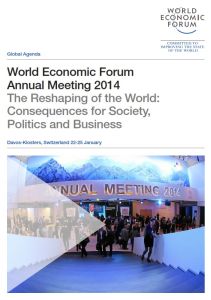Join getAbstract to access the summary!

Join getAbstract to access the summary!
World Economic Forum
World Economic Forum Annual Meeting 2014
The Reshaping of the World: Consequences for Society, Politics and Business
World Economic Forum, 2014
What's inside?
The World Economic Forum’s Davos conference highlights global challenges amid rapid change and innovation.
Recommendation
The World Economic Forum’s report of its 44th annual meeting in Davos, Switzerland, focuses on the challenges of a fast-changing world. Topping the list of risks is the threat of another financial meltdown, while other immediate problems include income distribution inequities, unemployment and corruption. Moderate successes include progress in improving water supplies, raising supply chain responsibility levels and making the most of sustainable “circular economies.” You might expect to find more concrete, actionable steps, but the diagnoses are clear beneath the diplomatic politesse and jarring optimism. getAbstract recommends this report to business executives, investors, activists and those seeking insight into what the international economic community is thinking. Meeting the threats on the economic horizon requires more than this elegant fortress of hope can achieve, but engaging the power base is a good start.
Summary
About the Author
The World Economic Forum is an international institution that is devoted to improving the world through public-private cooperation.




























































Comment on this summary